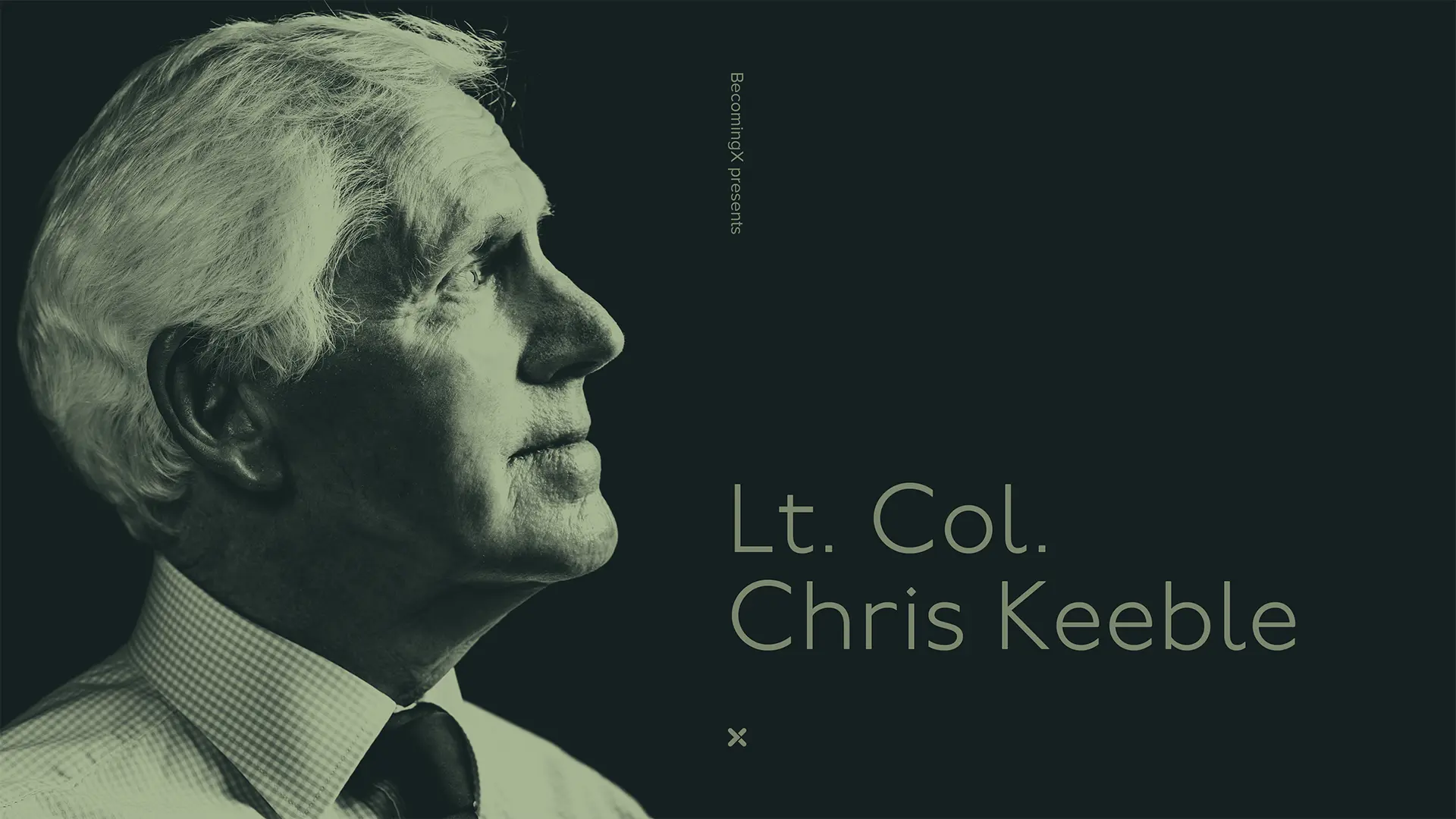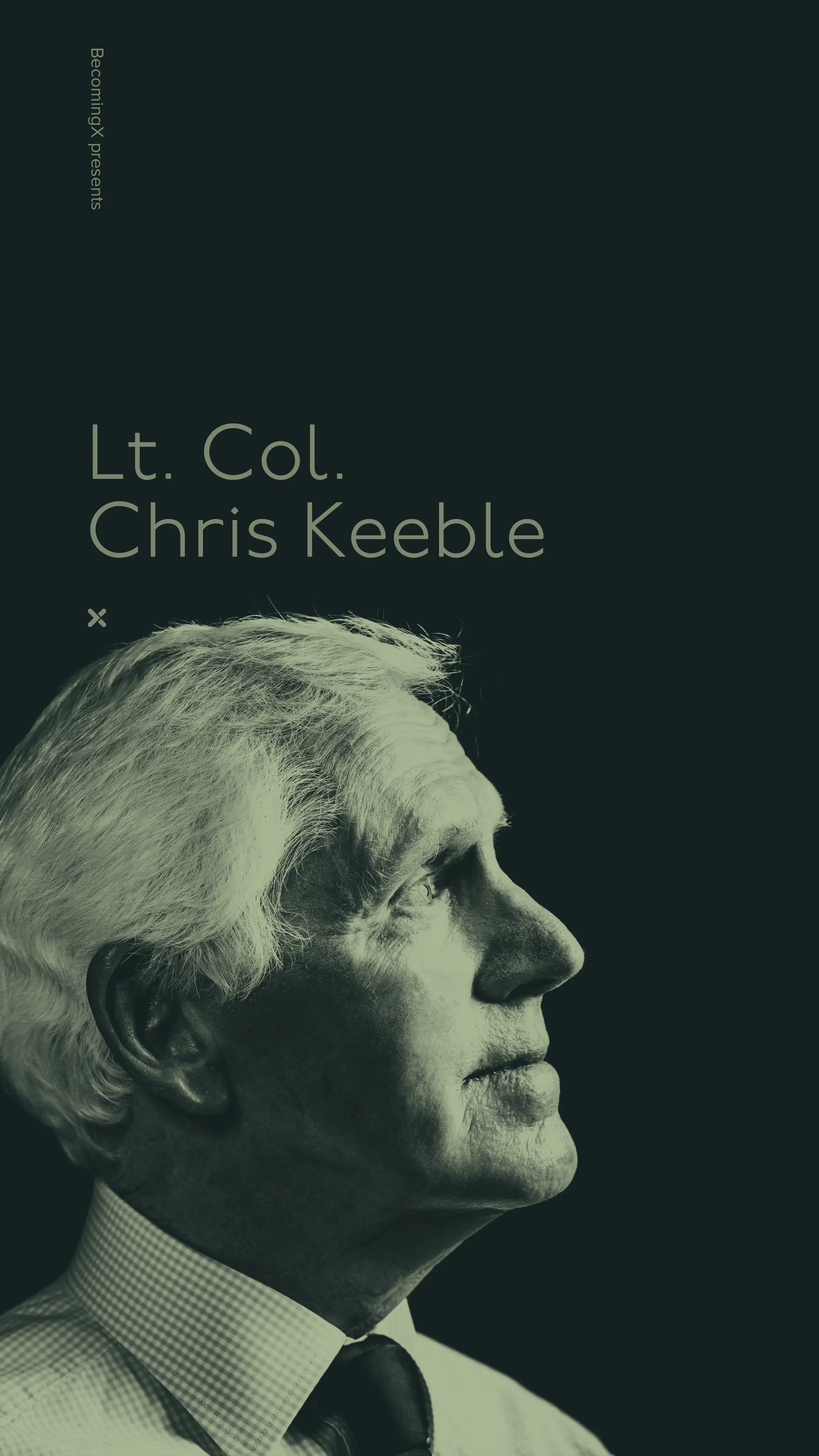

Lt. Colonel Chris Keeble negotiated surrender of a 1,000 strong Argentine force in the Battle of Goose Green in 1982, during the Falkland’s War. He offered them dignity in surrender and did not humiliate. He did not abuse his power. Outnumbered and outgunned, his courage and empathy saved hundreds of lives that day. On both sides of the battlefield.
“They were human people who mattered just as much as I did and deserved a break…we settled the dispute through peaceful means.”
Born in British India during the Second World War in 1941 and moving to the UK in 1947, Keeble’s early childhood experiences instilled in him a great appreciation for freedom and peace. He was inspired by the stories of military heroes and felt compelled to defend these ideals.
Despite being told he was “probably the worst candidate” the Regular Commissions Board had ever seen, Keeble wasn’t deterred and joined the Lancers as a Trooper. He didn’t let presumptions about his ability stand in his way and emphasises the most important lesson he learnt during his early career - selflessness. To think about not what you can do to progress your own goals, but what you can do for the team in order to achieve its purpose.
Fast forward to April 1982, the Battle of Goose Green. The first engagement between British and Argentine forces and a fundamental moment for setting the tone of the battle. Keeble’s Commanding Officer, Lt. Col. H Jones, had been killed. They’d been fighting for 60 hours, ammunition had near enough run out, it was -20oC, and soldiers were dying. Keeble found himself thrust into a command position and made a pivotal decision not to fight further…but to negotiate with the enemy and offer them peaceful surrender.
Keeble emphasizes the importance of goodwill. That we are all unique, therefore we are all priceless. On or off the battlefield, we should treat our neighbours as such.
Chris Keeble – video transcript
I love the idea that each person would look into themselves and say, "There will be no other person like me ever, never has been, nor ever will be. I am unique." And in that sense, if there's never been a duplicate of yourself, you are priceless, and you ought to treat your neighbour, as if they were really priceless.
Well, I was born in British India during the Second World War, and it wasn't until about 1947 when I left on a ship to come to the UK. If you take your mind back to 1955 when I was at school, we were highly influenced by all the stories that emerged from the Second World War, all of these great military and Air Force heroes, and I found that incredibly appealing. Ideas of freedom and peace really mattered to me. I was prepared to put my life on the line in the defence of freedom.
I felt that joining the military would be a way in which you could safeguard these things, and I went off to the Regular Commissions Board to be assessed as to whether I had the potential to be an officer. And eventually, at the end, I was told, "Keeble, you are probably the worst candidate we've ever had through the Regular Commissions Board," which was heartbreaking. But he said, "There is a possibility that you can join the Army as a Tom, as a private soldier," so I thought, "yeah, why not, it'd be a good experience." So I joined the 17th/21st Lancers as a Trooper.
Well, the fundamental idea that I learned in those early days is selflessness. It's about what you can do for the team to achieve its purpose, and that was quite a moment of transition. I began to really understand what it meant to be in the military. If you want to belong to something special, you have to be somebody special.
So that brought me in a way eventually to the Falklands War. When in April '82, the Argentine invaded the islands, claiming the rocks to be theirs, and the population would be evicted. Probably the most significant moment was when we had to capture a settlement called Goose Green, and the significance of that was that it would be the first engagement between British forces and Argentine forces, and whoever won that first engagement would set the tone for the battle. And combat is not really about capturing cities or destroying things, it's about breaking the enemy's will.
We'd been fighting for about 60 hours, and in the course of the battle, my boss, H.Jones, was killed, and I was his number two, so I had to assume command of the battalion. So I was thrown in at the deep end to take command, reorganise things, get the momentum of the battle going.
I knew I had to do my duty to Queen and country. I was in a position where one in six of us was killed or injured. Our ammunition supplies are pretty well run dry. The radio batteries didn't work in the cold. It was about minus 20 degrees, and there really were no more options left to manoeuvre. It didn't really find ourselves overwhelmed by the terror and the confusion and the noise and the death and the injury and the bleeding. We had a professional job to do, and we were going to do it regardless of the cost.
I hadn't slept for 40 hours, and I was at the end of my tether. I knelt down in the gorse and prayed. An extraordinary moment of transition from being tired, exhausted, uncertain, not sure how to deal with all this ambiguity and setback, to being crystal clear about how I ought to act. And I remember going up this gully full of smoke and detritus of battle and bodies moaning and saying to my subordinates, "Tomorrow, I'm going to walk down through the minefield, and I'm going to negotiate with the enemy and persuade them to surrender." And so, I got hold of a couple of Argentine prisoners of war and I said, "I'm going to release you tomorrow morning at dawn, and I want you to go down to your officers and I'm going give you the opportunity to surrender." I appealed to their Catholicism that we could do this another way.
Anyway, they left, they came back at 10, and we then walked down and met the Argentine commanders. And what was astonishing was that we were absolutely heaving, filthy, and we met these immaculate Argentine officers in this shed on the airfield, buttons polished, boots polished, and we looked them in the eye and said, "It's over." And they said, "Thank God you've come, because we've had it."
I said, "You can surrender with dignity. Please assemble on this piece of waste ground, and I'll invite you to lay down your weapons, sing your song, say your prayers, whatever you need to do. We're not going to humiliate you. We're not going to abuse you. We'll take you in as prisons of war, we'll feed you, and then we'll dispatch you down to the base," which we did.
In the end, fundamentally, they were human people who mattered just as much as I did, and deserved a break, which we gave them, and we settled the dispute through peaceful means.
The key idea that holds people together is a sense of goodwill. In the military, you call it morale. And I know from my military experience, that there was always a shortage of ammunition, there was always a shortage of time. There was always a shortage of intelligence. There was always a shortage of numbers of people we needed for the task, so there was always a gap between the resources available and the mission to be achieved. And the only way to close that gap is not with more resources, it's by goodwill, a will to the good of my neighbour, of the group, of the purpose, and for each person to be prepared to go the extra mile, to try a little harder, to imagine something more creative, build relationships with others, deepen them as best you can. And I think that's the secret of success.
END CARD
Chris Keeble became a celebrated military leader who played an instrumental role in the Falklands War.
Outnumbered and outgunned, he led 2 Para in the Battle of Goose Green after his Commanding Officer Lt. Col. H Jones was killed.
His negotiated surrender of the 1,000 strong Argentine force resulted in a major victory for the British forces and saved hundreds of lives on both sides.
He was awarded the Distinguished Service Order for his leadership, a medal he dedicated to the gallantry and sacrifice of his battalion.